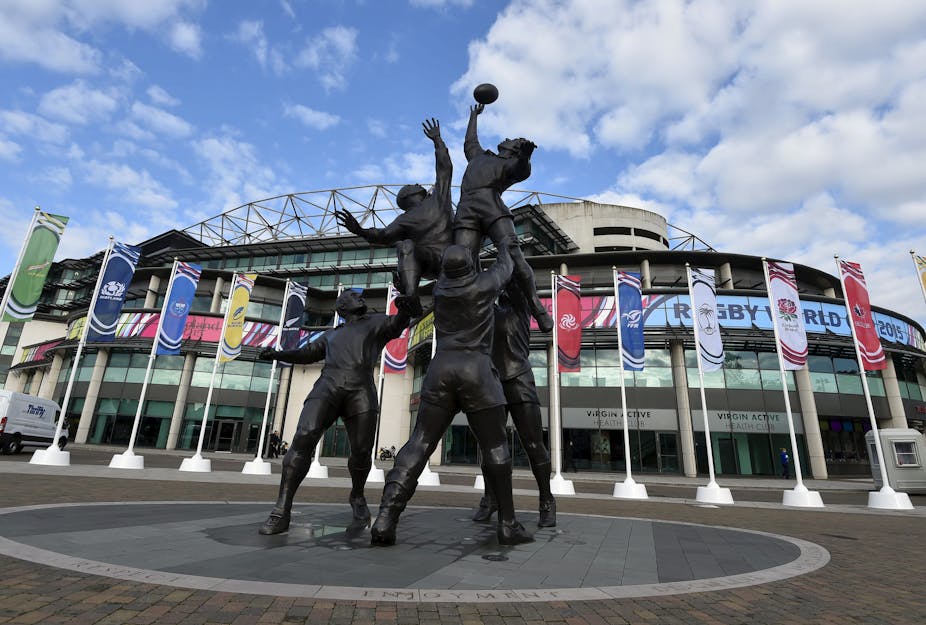The Rugby World Cup, arguably the biggest sporting event on the planet this year, kicks off on Friday September 18 when England take on Fiji at London’s Twickenham Stadium.
England (winners in 2003) are among the favourites again although history would suggest that the champions are more likely to come from the southern hemisphere, as Australia (1991 and 1999) and South Africa (2007) were winners of the three previous World Cups that have taken place this side of the equator.
That’s why the reigning champions New Zealand are currently the bookies’ favourite.
The evolution of the cup
While the Olympic Games are well over 100 years old and the Football World Cup is in its ninth decade of competition, the Rugby World Cup first took place in 1987. This in part was due to the fact that until 1995 rugby union was an “amateur” sport, although some places had quite a relaxed view to the payment of players.
The 1987 event, co-hosted by New Zealand and Australia, was a relatively low-key affair in which only invited nations took part. The All Blacks claimed the first title but it took until they hosted a World Cup for a second time in 2011 for the team to be victorious again. Staging the event there was a somewhat contentious decision, as Japan had put in a particularly strong bid. Since then, those governing rugby have taken time to embrace a more international outlook. Awarding the 2019 finals to Japan was an important step forward.
The players who represented their nations in 1987 were a variety of shapes and sizes and came from a number of different occupational backgrounds with policemen, builders and salesmen all having to seek permission from their employers for time off to play in the tournament.
Matches only took place during the day as few stadiums had floodlights – and there was limited commercial involvement. Today, the leading rugby nations all comprise full-time athletes and many matches are scheduled for prime-time television.
These teams now come in to the stadium with an army of dieticians, psychologists, analysts and fitness coaches. There are sizeable wages for the leading players and tickets for the matches do not come cheap.
A host of nations
The game has always been controlled by a narrow core of nations. South Africa did not take part in the first two tournaments but were somewhat controversially awarded the 1995 finals and went on to achieve a momentous win, under the eyes of new president Nelson Mandela, that has since been celebrated in the film Invictus.
Four years later the Millennium Stadium in Cardiff with its ultra-modern retractable roof staged the final, but matches were also played in France and other nations across the UK.

The usual suspects
So who will lift the trophy at Twickenham on October 31? Only men from four nations have ever lifted the trophy (Australia, England, New Zealand and South Africa) and just five different nations (the above four and France) have appeared in the final. It is highly unlikely that any country outside of a very small group of six will make it as far as the semi-final stages. This has only happened on one occasion when Argentina achieved third place in 2007.
Perhaps a team coached by a New Zealander will win it. This applies not just to the All Blacks, but also includes the reigning Six Nations champions, Ireland (a dark horse), Scotland (a nation whose governing body have a stated aim to win the trophy this year), and Wales. There will be New Zealand men wearing the colours of a range of different nations including the now obligatory collection of “Kilted Kiwis” in the Scotland squad. A number of English-born players will play for Wales against the country of their birth (Jake Ball, Alex Cuthbert and George North).
How about a first-time champion? France have made it to the final on three occasions and are the only one of the five nations to have appeared in a final who do not have a World Cup in the trophy cabinet.
A host nation victory is also possible. England 2015 will reverberate with the sounds of Jerusalem and Swing Low Sweet Chariot, but some matches will also be taking place at the Millennium Stadium in Cardiff. Wales are also a (kind of) host and should they get past the tricky group stage then there will be dancing in the streets of Cardiff, Conwy and Caersws.

Cardiff was also one of the venues for test match cricket this summer when England defeated Australia to regain the Ashes. There will definitely be some cricket scores in the tournament and the gap between the best in the world and the rest may mean scores should easily surpass the first-innings score of Australia in the fourth test.
To help make up for their team’s defeat in the cricket, Australia could complete a clean sweep of World Cups hosted by England/Wales/UK to regain bragging rights. South Africa will also be quietly confident about becoming the first three-time champions.
Richard Burton once suggested that rugby was a game of massive lies and stupendous exaggerations. He knew a thing or two about the game and would probably have agreed that it is about time Wales joined the exclusive list of World Cup winners.

